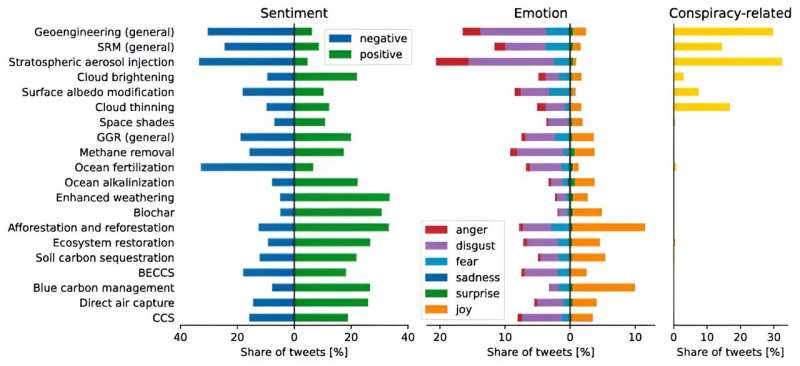This article has been reviewed according to Science X's editorial process and policies. Editors have highlighted the following attributes while ensuring the content's credibility:
fact-checked
trusted source
proofread
Mother Nature knows best when it comes to climate solutions, social media users say

A survey of more than a million social media posts suggests that people feel more positive about nature's ability to solve climate change than human technology, according to new research published in the journal Global Environmental Change.
Researchers analyzing 1.5 million posts on X (formerly Twitter) using the latest artificial intelligence-driven language models found expressions of "disgust" and "fear" related to the term "geoengineering," which is often associated with radical technology such as spraying aerosols into the atmosphere or solar space sails.
But posts about nature-based efforts to protect carbon-storing ecosystems like rainforests, kelp forests under the sea and peat bogs offered more positive expressions such as "joy," according to researchers from the University of Cambridge, the Mercator Research Institute, International Institute for Applied Systems Analysis (IIASA) and Boston University.
"Social media provides an opportunity to tap into the ocean of thoughts and feelings people are sharing in public conversations about emerging technologies," said co-author and Assistant Professor Ramit Debnath, a Cambridge Zero Fellow at the University of Cambridge.
"Governments and global organizations need to consider how the voting public will engage with proposed solutions of climate action."
According to forecasts from the UN body for assessing science related to climate change, the Intergovernmental Panel on Climate Change (IPCC), the strategy of gradually reducing greenhouse gas emissions, such as carbon dioxide and methane, will no longer be enough to limit global heating to below 2 degrees Celsius, a tipping point for the intensification of catastrophic weather events such as extreme heat, storms, droughts and floods.
The IPCC has said that in addition to the gradual reduction of global emissions from burning fossil fuels for power and heat in industry, homes and for travel and food production, humanity will need to actively 'geoengineer' climate solutions to prevent further warming through removing the greenhouse gases which trap energy from the sun, or by reflecting away excessive sunlight.
Researchers analyzed X-user posts from 2006-2021 on 20 emerging climate technologies, from restoring ecosystems and planting trees to more invasive approaches like artificially modifying cloud production and solar radiation management, as well as generic 'geoengineering' posts.
Public opinion about these technologies is difficult to gauge through traditional surveying methods, so searching through posts on X is one way of capturing unvarnished opinions, the study's authors said.
"When you're not familiar with [these] issues, you can be strongly influenced by the way the questions are asked," says Finn Müller-Hansen, researcher in the Mercator Research Institute on Global Commons and Climate Change (MCC), and lead author.
"That's why we chose a different approach: we were interested in how people engage with these topics without being asked," said Müller-Hansen.
Among the almost 800,000 posts on X generally discussing "geoengineering," negative sentiments (present in 30% of all tweets) outweighed positive sentiments (6%).
However, when the researchers dug into opinions on specific solutions, they found a more positive reception for all greenhouse gas removal strategies (24% positive, 14% negative) than for technologies involving solar manipulation (9% positive, 24% negative).
This trend increases the more the removal is perceived as "natural," and the greatest approval was found for tree-planting solutions, also known as "afforestation."
The authors conclude the paper with a recommendation to avoid the use of the often-misunderstood term "geoengineering," which includes all the efforts to mitigate climate change from both technological to natural solutions.
"From our study, we've uncovered where the public anxiety about 'geoengineering' solutions is being directed," said Debnath.
"It's up to scientists and policymakers to either clear up these concerns and try to bring people around, or listen to the public, who at this moment are more supportive of nature-based solutions."
More information: Finn Müller-Hansen et al, Attention, sentiments and emotions towards emerging climate technologies on Twitter, Global Environmental Change (2023). DOI: 10.1016/j.gloenvcha.2023.102765
Provided by University of Cambridge





















